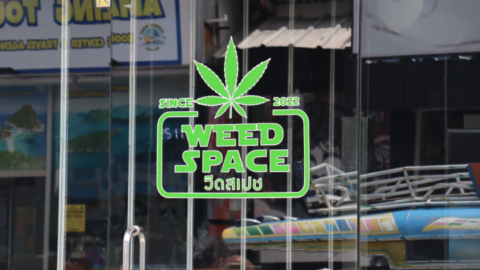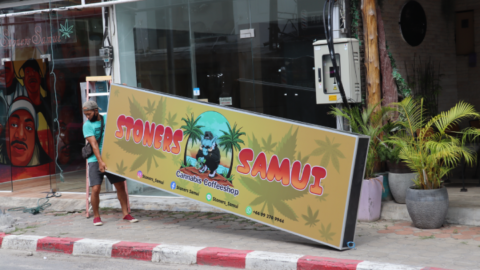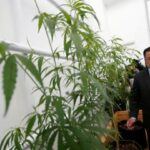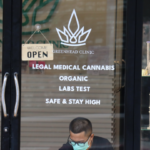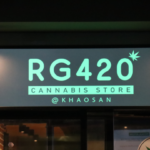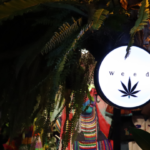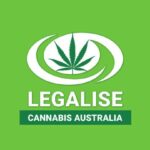Thailand’s Cannabis Industry Is Taking Off Under a Hazy Legal Grey Area
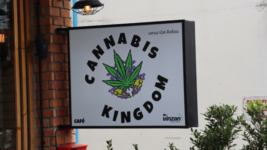
The burgeoning legal cannabis market operating in Thailand is a beautiful thing to witness. No longer are police officers busting individuals over the whiff of a joint, but rather locals and foreigners alike can follow that scent to a legitimate store on a main street, enter in and buy some grass.
Officially, the plant is only legal for medicinal purposes. Although, the proliferation of cannabis stores selling buds, edibles, bongs and rolling papers suggests that behaviours are taking place that would be classed as recreational in Australia.
But the cops are fine with all this. Some cannabis stores are located just down the road from the police station.
Thailand removed the entire cannabis plant from its previous scheduling as a narcotic drug on 9 February this year, and from June 9, it’s been legal to grow, sell and consume. However, three months later and the long-awaited regulatory Cannabis and Hemp Bill remains in the draft stage.
So, there’s a grey haze of uncertainty hovering over the Thai weed market. Conservative politicians continue to raise concerns in parliament about the potential for it to be used recreationally, whilst retail outlets are selling pre-rolled joints that you can sit down and toke on instore.
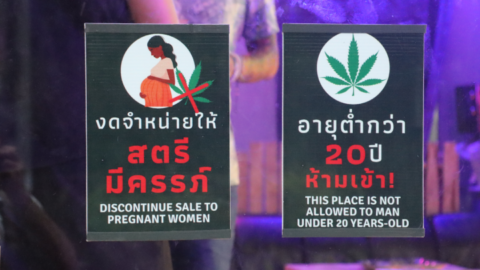
A regulated market nonetheless
Thai public health minister Anutin Charnvirakul is the man behind legalising cannabis, or ganja as it’s known locally.
The Bhumjaithai Party leader was elected head of the Ministry of Public Health in March 2019, just one month after the nation had officially legalised medicinal cannabis in oil or pill form on prescription.
Many put the fact that most criminal sanctions pertaining to the plant were removed without the regulatory cannabis legislation having been passed down to design, in order to let the currently untaxed industry grow, especially after the economic downturn the COVID pandemic brought.
However, legal cannabis already has a number of regulations governing it. The current coalition government, of which Charnvirakul is deputy PM, has encouraged households to grow as many plants as they like. The only requirement is to register their number on the Plookganja app.
Edibles, mainly gummies and brownies, are readily available. However, these cannot contain more than 0.02 percent tetrahydrocannabinol, or THC, the psychoactive component of the plant. Any products with a stronger content remain illegal and can lead to criminal convictions.
And people can’t simply go around smoking it in the main street either, as consumption is banned in public. Doing so can result in a charge of public nuisance, which carries a maximum penality of up to 3 months in prison and/or a 25,000 baht fine (around $1,000 AUD).
The Thai government further issued a directive on 17 June, which incorporated cannabis into its pre-existing regulations relating to Thai traditional medicines. This makes it illegal to sell to, or to be consumed by, people under 20 years old, pregnant women and those breastfeeding.
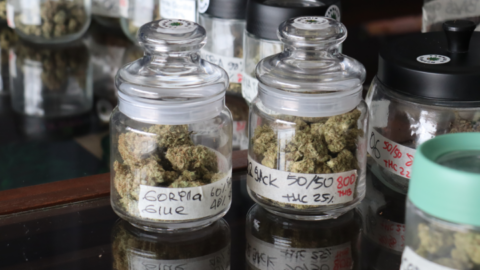
Kingdom come
Cannabis Kingdom is located in Koh Samui’s Fisherman’s Village. It’s a step up from many of the other cannabis stores springing up around the popular tourist destination. It’s a stylish setup, with quality product and the staff are knowledgeable about cannabis and its medicinal properties.
Like all cannabis stores operating in Thailand, it has a relationship with a farm that cultivates the product, under license of the Ministry of Public Health. And unlike extracts, there are no limitations on the THC level of the organic plants.
The first floor of Cannabis Kingdom consists of a café and bar and a showroom containing a variety of strains of the herb, while its second level is something of a social club: there’s a chillout area, a balcony for smoking the product, and it can be hired out for functions.
A staff member explains that she’s had foreign customers attending the store looking for product that can relieve their pain, and she also points out a strain called Wedding Crashers that has a high CBD content, another cannabinoid like THC, which is ideal for relieving anxiety.
A legal assessment
The Cannabis and Hemp Act was brought on for debate in the Thai House of Representatives on 14 September, and a majority of parliamentarians voted that it be sent back for further drafting, asserting that the wording of the legislation was too vague and it could pose health risks to youths.
The Bhumjaithai Party opposed the decision and maintained this could mean that the bill won’t have enough time to be passed before the next federal election in March. So, if that’s the case, it looks like the cannabis market will continue to develop in the same way it has been since June.
Sydney Criminal Lawyers spoke to a European expat named Alex, who’s been providing legal consultancy to Cannabis Kingdom. He considers it a “smart move” on the government’s part to allow the market to develop in this semi-regulated way, so it can gauge what its dealing with first.
The lawyer added that he considers the finalised legislation will place a 17 to 20 percent tax on cannabis products, which would be similar to the rate in Canada. And in terms of restrictions, he predicts prohibitions on internet sales, advertising, delivery services and vending machines.
Alex also outlined, as many store owners tend to, that a major driver for the Thai government to legalise the entire cannabis plant was to draw tourists back to the country following the pandemic shutdown.
Indeed, back in January, the Thai Food and Drug Administration spruiked an idea of setting up zones where tourists would be permitted to consume pot freely.
Reducing the harms
The move to weed legalisation is part of a broader drug law reform agenda, in a nation that was once notorious for its zero-tolerance approach to illicit substances.
A new Thai Narcotics Code came into effect last December, and it aims to prioritise treatment over incarceration.
The nation which once ramped up its punitive approach to cannabis at the behest of the US Reagan administration, has this year been meeting with the UN Office on Drugs and Crime to discuss its new code, which makes it the first country in the region to prioritise alternatives to imprisonment.
Thailand has the largest prisoner population of any ASEAN nation. More than 80 percent of those inside are in there due to drug-related matters. However, on the day cannabis was legalised, 3,071 inmates detained purely on cannabis offences were released from prison with clean records.
The land of smiles
Along the main strip of Chaweng, Samui’s busiest town, every block seems to have a cannabis store upon it and more are springing up daily. One of those is Weed Space, which had only just opened seven days before SCL paid it a visit.
The owner, Mr Best, explained that he has a range of top shelf and regular cannabis flowers, “the difference being the level of THC”, and he also has a large amount of cannabis cookies on offer.
According Best, consumption is fine, as long as one is discrete. “This is for medical,” the cannabis store owner advised. “Smoking is okay in your room. But not anywhere, because when you smoke outside, some people who don’t like it will tell the police and they can catch you.”
